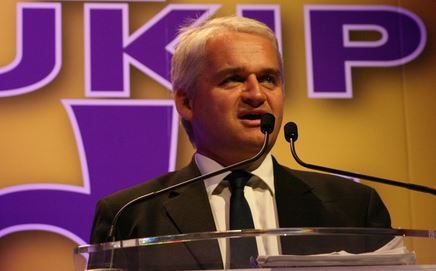Ukip’s Economic Spokesman Patrick O’Flynn has attacked the right of his party, branding it “ultra-Tory libertarian”, and accusing it of being “politically completely away with the fairies”. He has also accused some “egos” within the party of ranging “out of control”, urging his colleagues to be “team players”.
O’Flynn, the former Political Editor of the Daily Express, joined Ukip in 2013 and was appointed director of communications for the party in January last year. In May he was elected as an MEP for the Eastern Region, and was quickly appointed as the economic spokesman for the party.
As such, he caused controversy at the party’s annual conference last September when he used his keynote speech to try to introduce a “wag tax” on luxury goods into the Ukip manifesto. Ukip leader Nigel Farage quickly killed off the idea, telling the BBC “I have to say, I personally am very happy to give freedom to our spokesmen and spokeswomen to float ideas, but I’m pretty certain that while I am leader that will not be in our manifesto.
“It was never put forward as a policy. It was put forward as something that should be investigated … As far as I’m concerned it’s dead, it was a discussion point yesterday, it isn’t going to happen.”
O’Flynn has been instrumental in focusing the party on winning Labour votes in the north of England, a move that has alienated some long term supporters who are committed to the classical liberal policies formerly embraced by the party such as a flat rate of tax across all income brackets.
In a tape recording of a recent Ukip meeting, which has been obtained by the Huffington Post, Mr O’Flynn admitted that this shift had caused “friction” within the party.
“Sometimes I put things at the limit for some of that libertarian wing of the party, ad they can sometimes regard me as a bit of a leftie,” he said. “I think I was called ‘Pinko Patrick’. I’m a pragmatist on this stuff I personally I think the flat tax was simply too right-wing.”
The flat tax policy was retained by Ukip up to 2013, even making it into the manifesto for the Eastleigh by-election, where Ukip’s candidate Diane James came within 1,771 votes of unseating the Liberal Democrats, beating the Conservatives into second place.
During the course of the meeting, O’Flynn said that, during December last year when the party suffered a few PR gaffes, “egos [got] slightly out of control”, adding that the party needed to avoid becoming “self-indulgent”, and that colleagues should not “stop being team players” given the proximity to the next general election.
Yet he also opined that “very hard-line libertarians” within Ukip “want to shrink the state completely”. Speaking for the British people at large, he said “I’m very much someone who will not saddle Ukip with policy of that level of ideological purity that won’t wash with the British public.”
He justified his comments by arguing that “it’s our duty to be populist to get those MPs into parliament.”
However, low tax manifestos have historically brought success for parties of the right. In 1992, John Major won the election with 41.9 percent of the vote on a manifesto which stated “Politicians must never make the mistake of thinking the state always knows best, or that it is entitled to the lion’s share of people’s money I believe in low taxes not just because they ignite enterprise – the spark of economic growth – but because they put power and choice where it belongs: in your hands.”
Nonetheless, O’Flynn is adamant: There are, I think, a very small proportion of the party that would love us to be that kind of British version of the Tea Party. I think that’s a complete blind ally for Ukip to go down and would betray our greater purpose. So sometimes that does cause a bit of friction. But you know I’m prepared to fight those battles,” he said.

COMMENTS
Please let us know if you're having issues with commenting.